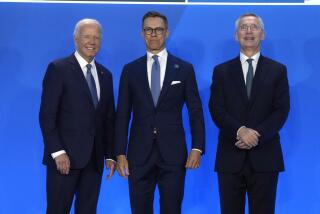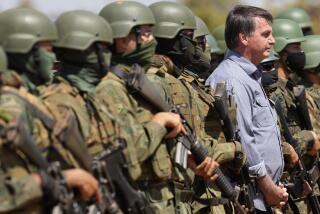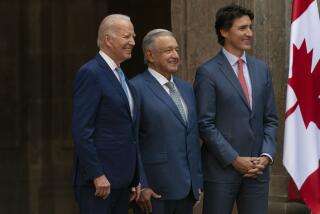5 Nations Pave Way for Cut in Arsenals, Troops : Central America: U.S. supports the move to trim armies in the region after a decade of escalating tensions.
- Share via
SAN JOSE, Costa Rica — Encouraged by a U.S. policy shift favoring smaller armies in the region, leaders of five Central American countries agreed Tuesday night on a procedure for negotiating limits on the military manpower and arsenals amassed during a decade of guerrilla conflicts and superpower tensions.
After a full day of talks, military officers and diplomats vowed to seek a “reasonable balance or proportional equilibrium” in the size and strength of their armies and to “define a new model of security relations” among their countries based on cooperation. Armed forces, they declared, will become purely defensive in nature.
Starting Sept. 10, in talks to be held every 60 days, the five governments agreed to compile public inventories of their military might and set limits for each country, based on its size, population and extent of its borders. Countries still fighting guerrilla insurgencies--a reference to El Salvador and Guatemala--will be exempt from those limits until there is peace, according to the agreement.
Presidents of the five countries--Costa Rica, El Salvador, Guatemala, Honduras and Nicaragua--called for Tuesday’s meeting at a regional summit in June. All are elected conservative civilians intent on slashing defense budgets to achieve a “peace dividend” and reverse a decade of deepening poverty.
However, Tuesday’s meeting did not make clear whether the new regional balance will require major reductions in current levels of forces. And it failed to adopt a Nicaraguan proposal to freeze those levels during the negotiations.
The goal of arms reduction got a boost last month when Nicaragua’s army, still commanded by leftist Sandinista officers, slashed its manpower by half, to about 40,000 troops, after the Sandinista government’s electoral defeat prompted the U.S.-backed Contra guerrillas to disband.
And unexpected support came from the Bush Administration, which urged its client armies in El Salvador, Guatemala and Honduras to send high-ranking officers to meet here with Gen. Humberto Ortega, the Sandinista commander. Ortega is seeking cuts in the other armies as a condition for further reducing his own.
After expanding friendly armies with millions of dollars in aid during the 1980s to counter a Soviet-supplied Sandinista arms buildup and a leftist insurgency in El Salvador, the United States sent a memo to all five governments last month urging “frank and open discussions” here on how to reduce the size of armies and strengthen civilian control over them.
“The proliferation of weapons and the size of national (armed) forces has contributed significantly over the decade to regional insecurity,” the State Department memo said. “We believe that development of smaller, apolitical and professional forces can meet the threat posed by irregular and insurgent forces better than large, offensive forces.”
El Salvador’s armed forces, now the region’s largest, has 56,000 members, followed by Nicaragua’s and Guatemala’s with about 40,000 each and Honduras’ with about 20,000. Costa Rica abolished its armed forces four decades ago.
The Administration’s push to reduce these armies is significant because it comes during a stalemate in talks between the government and guerrillas of El Salvador over the size of that nation’s military. The Salvadoran government has insisted that the rebels lay down their arms before it makes any reductions.
Central American officials said the Salvadorans’ participation in the arms talks could help break the stalemate with the guerrillas by giving the government a face-saving way to start cutting its armed forces without appearing to yield to rebel demands.
Participants in Tuesday’s meeting included the deputy foreign minister of each country: Col. Juan Orlando Zepeda, the Salvadoran vice minister of defense; Gen. Roberto Mata, the Guatemalan deputy chief of staff; Col. Cesar Maradiaga, the Honduran vice minister of defense; Gen. Ortega of Nicaragua, and observers from Panama, the United Nations and Organization of American States.
More to Read
Sign up for Essential California
The most important California stories and recommendations in your inbox every morning.
You may occasionally receive promotional content from the Los Angeles Times.










